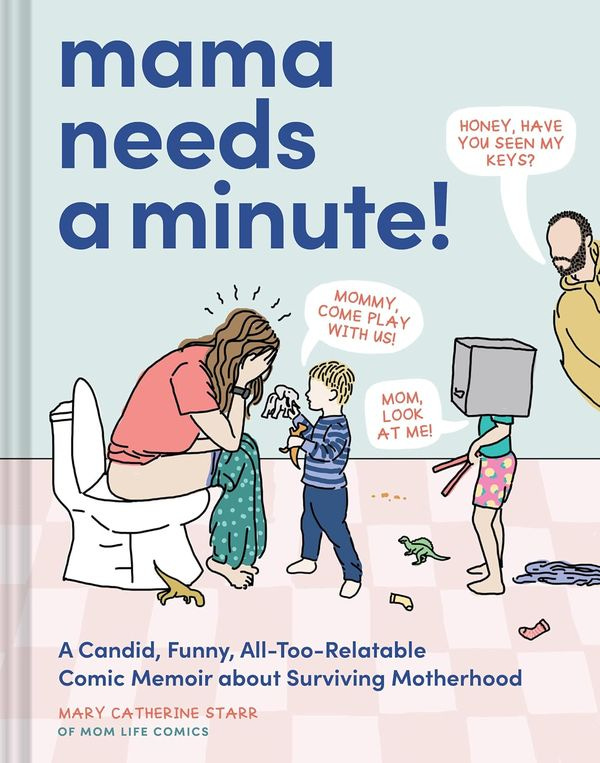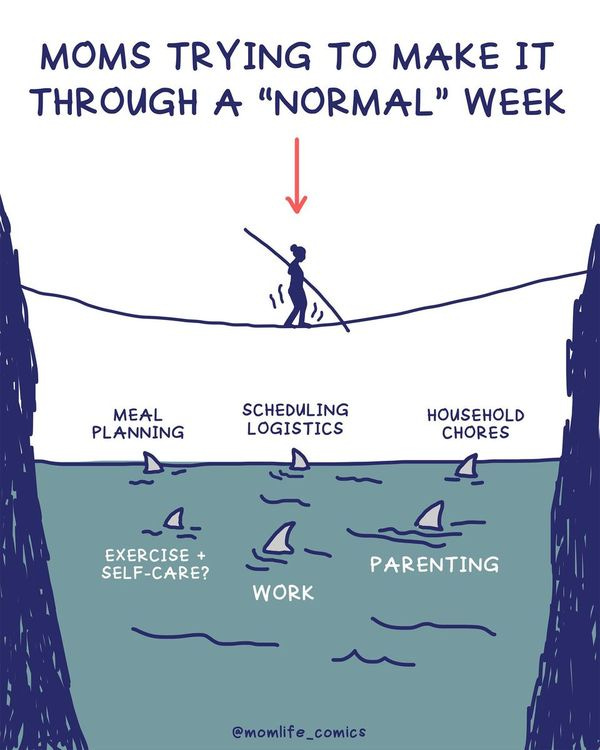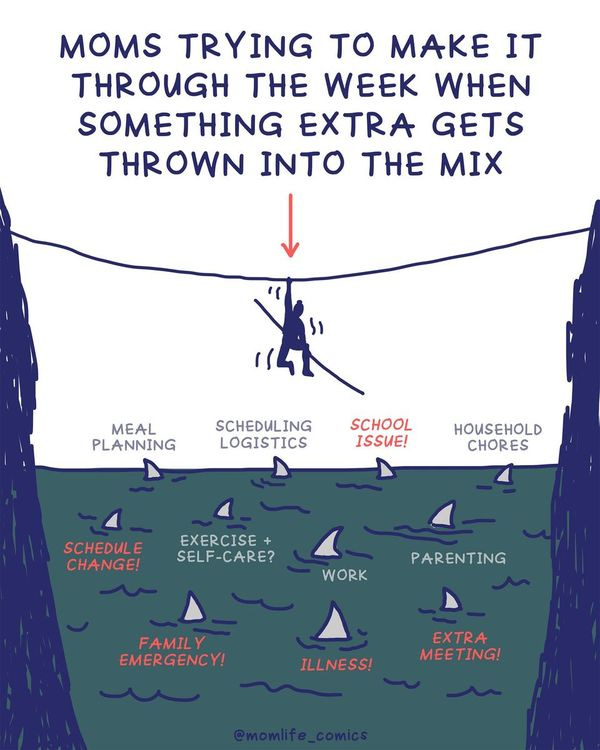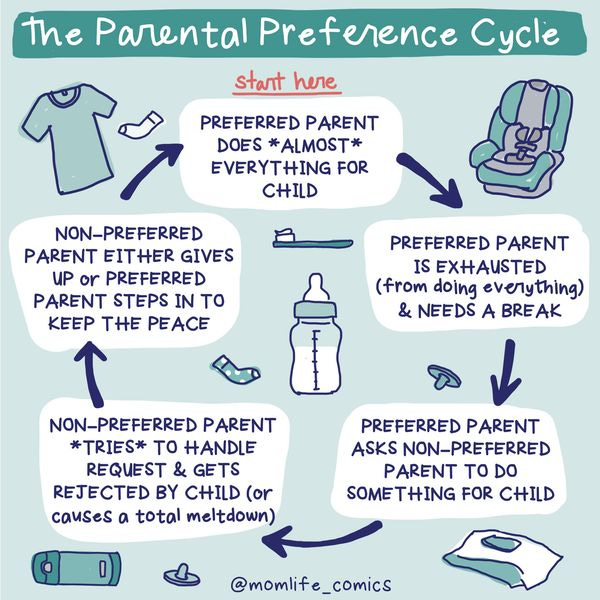He could do it - but they'd scream
Mary Catherine Starr on the feedback loops that shape household labor
Welcome back to the What’s On Your Mind? series, where I interview interesting folks about the to-do’s we don’t talk enough about. If you’d like to nominate someone - or yourself! - for an upcoming interview, please reach out.
This week: What’s on Mary Catherine Starr’s mind? Starr is an artist whose comics about parenting—especially gender inequality in parenting—epitomize the laugh-so-you-don’t-cry approach to domestic life. If illustrating academic papers was a thing, I’d absolutely hire her to turn my research findings into comic strips. Starr has a knack for calling out the absurdities and quiet injustices embedded in common family routines—like the “parental preference cycle” she unpacks below.
If you like what you read, take a look at her HILARIOUS graphic memoir, Mama Needs a Minute. Now that I’m a mom myself, the cover image is almost painfully relatable. Several times a day, it seems, my daughter is crying, my dog is whining, and my husband is asking me a question, all at the same time. (Fortunately, neither my newborn nor my dog can yet follow me into the bathroom…)

Alas, as Mary Catherine admits below, even when you are all-too-aware of underlying inequalities, it’s still hard to shake them.
Who do you carry mental load for – and who do you share it with?
I carry the mental load for my two kids—ages 8 and 5—and my husband. I share the mental load with my husband and he has been taking on more and more of it over the past few years, but I still carry the majority of the day-to-day mental load for our family.
When it comes to talking about mental load, I love the breakdown of tasks into three separate categories: Conception, Execution, and Planning, which I first learned about from Fair Play by Eve Rodsky. In our household, my husband is doing a ton more of the execution now than he ever has before, but I’m still handling a lot of the conception and planning. (Ed. note: This is a super common pattern. Physical labor is usually much easier for couples to shift than cognitive labor is.)
What tasks, issues, or problems are occupying your mental real estate these days?
Right now I’m thinking a lot about summer logistics (school gets out this coming week!) and how we’re going to juggle everything this summer. We live on Cape Cod where the summer is the most amazing time of year, but it’s also really busy and my husband and I both work all summer. Every summer we piece things together with various camps and trading off child care while we work, and every summer it’s crazy—but it’s also really important to me that we make memories as a family and actually enjoy our summer! So I’m doing lots of mental planning around all of that. Also, my mom, who isn’t local, has been having some major health issues lately, so my normally overloaded mind has been handling a lot of the logistics for caring for her, as well.
If you could find a way to offload one mental labor task (or category of tasks) to someone or to some tool/service – and, critically, you knew it would be handled well - what would you most like to let go of?
Everything related to keeping the household going! Meaning: the cleaning, the laundry, the maintenance and upkeep, the organization of toys and clothes and rooms, the restocking of household supplies and food, the sorting and recycling of the kids’ art projects and supplies, etc. I guess I’d like a full-time “household manager” who could handle all of this for us!! Doesn’t that sound dreamy? (Ed. note: Um, yes. How do I get one of those?!)
What’s one mental labor task (or category of tasks) that you’d want to hold onto, even if you had the opportunity to let it go?
I like being involved in what’s happening at the kids’ school and in their classes. Although managing all of the school emails and activities and homework and field trips and events is a lot, I like being a part of this important aspect of their lives. I want to be a part of anything related to helping the kids grow and learn and would be sad if I wasn’t in the know about these kinds of things.
Do you feel like your current division of mental labor matches your ideal? If not, what are the biggest obstacles to reaching that ideal?
No, definitely not, but I think we’re moving in the right direction. Right now, we have a few major obstacles that get in the way of our ideal:
The first is intense parental preference. Both of our kids have a strong preference for me and want me to do everything for them. This means we have a lot of power struggles and meltdowns because the kids want me to do things for them instead of my husband. Over the years, this dynamic has led to a big imbalance in our household; many times it just feels “easier” for me to handle something than deal with the ensuing meltdown if he does it, which means that I end up knowing much more about the daily logistics for the kids (since I’m the one doing a lot of these things for them–because they want me to) and thus, the mental load of these logistics continues to fall on me.
The second major obstacle is just our schedules. My husband and I work opposite schedules and are often ships passing in the night. Because of this, we don’t have as much time to get on the same page about things and/or to think more thoughtfully about dividing up tasks/the mental load.
What are your favorite tools or techniques for managing household logistics with your partner (or whoever else you share the load with)?
We’re getting a lot better at doing little daily check-ins about family logistics and/or planning for the next day together and going over what needs to happen when. The more that we do this kind of thing, the better. We also moved to a shared Google Calendar and a Skylight Calendar (that sits on our kitchen counter and displays the family’s Google Calendar). This has helped a lot with redistributing the mental load surrounding the family’s schedule. Oh, and of course, couple’s therapy! This has made the biggest impact on our communication, which helps us manage everything.
For more Mary Catherine, follow her on Instagram, check out her Substack, or buy her new memoir, Mama Needs a Minute!








Great interview!! I hadn’t heard of Catherine’s work before.
When father's are just involved in the "execution" part of childcare then they are behaving like "day laborers." Waiting to be told what they are to do. Doing that task only. What women need is a fully engaged "professional worker." Someone who fully takes on the job of parent. Shows up early, stays late, always looking for new aspects to the job, following the development of the project and its changing needs, doing research, anticipating new issues, assuming full responsibility for all components of the job, not sitting around waiting for someone to hold their hand and tell them what to do next. Day laborer = no mental load. Professional...that's the mental load.